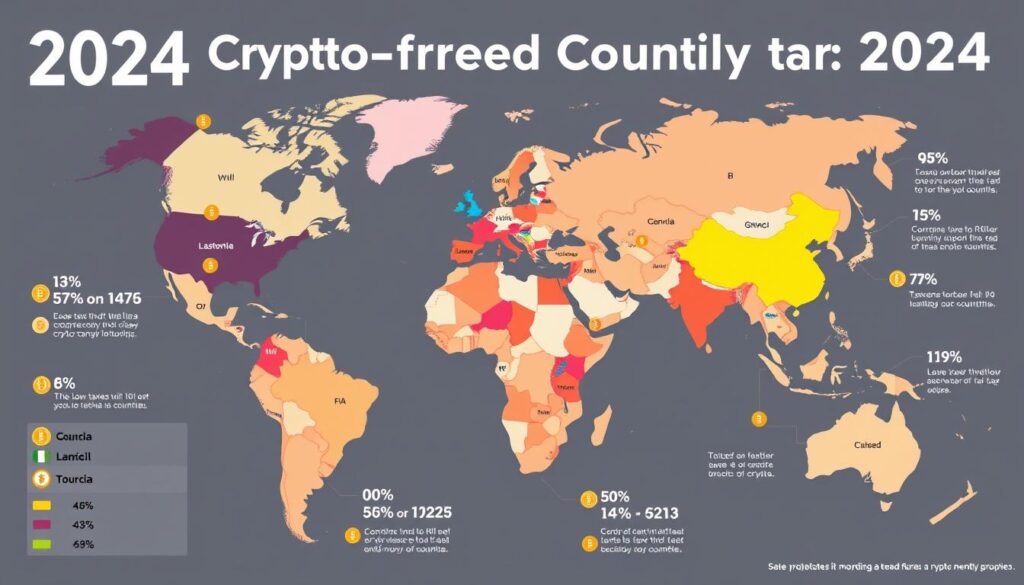Last Updated on: 20th September 2024, 06:34 am
The cryptocurrency landscape is constantly evolving, and in 2024, various countries emerge as crypto-friendly nations with favorable tax regimes for investors. This article will explore the best countries for crypto enthusiasts seeking low taxes and advantageous regulations. Focusing on tax incentives for long-term holders and the presence of significant blockchain projects, we aim to guide prospective investors in making informed decisions about their financial strategies. As the conversation around blockchain adoption continues to expand, understanding the nuances of individual country regulations is crucial for navigating this competitive landscape. The journey to finding the perfect location for your crypto investments starts here, as we compare taxation and investment environments across multiple jurisdictions12.
Key Takeaways
- Countries vary significantly in their tax treatment of crypto investments.
- Portugal offers a 28% tax rate for short-term gains, making it essential to hold crypto long-term for tax benefits.
- Malta’s tax regime can drop as low as 0% depending on earnings and residency.
- The UAE stands out with zero taxes on individual crypto gains, promoting a robust investment environment.
- Germany’s crypto taxation depends widely on the total annual income of the investor.
The Rise of Crypto-Friendly Nations
The emergence of crypto-friendly nations highlights a global shift towards more accommodating cryptocurrency regulations. Countries are revising their policies to facilitate blockchain adoption and to create effective crypto innovation hubs. Malta stands out for its advantageous taxation policies that promote growth in the blockchain and cryptocurrency sectors3. Switzerland hosts the “Crypto Valley” project, a thriving ecosystem for blockchain technologies4.
Germany simplifies tax reporting for crypto activities by treating cryptocurrencies as private money3. Notably, countries like Estonia and Singapore offer tax exemptions for specific crypto operations, fostering innovation3 and establishing clear standards that encourage investments in digital assets4.
El Salvador’s groundbreaking move to classify Bitcoin as legal tender represents a radical shift towards mainstream blockchain adoption5. In the same vein, Ukraine’s legalization of cryptocurrencies aims to bolster international support amid ongoing challenges5. These shifts reflect a growing recognition of cryptocurrencies as pivotal to economic transformation.
As nations like the Cayman Islands eliminate capital gains and income taxes on crypto activities, they aim to attract businesses looking for favorable operating conditions5. This trend indicates a broader recognition of the potential for innovation in the cryptocurrency sector.
Understanding Cryptocurrency Regulations

Understanding the landscape of cryptocurrency regulations offers invaluable insights for investors navigating the ever-evolving crypto markets. Across diverse regions, regulatory frameworks vary significantly, impacting taxation, compliance obligations, and trading policies. Among the 60 countries analyzed, cryptocurrency is fully legal in 33, partially banned in 17, and generally banned in 106. Notably, twelve G20 countries, representing over 57% of global GDP, have fully legalized cryptocurrencies6.
Regulatory measures can classify cryptocurrencies as currencies or property, which plays a crucial role in how investors are taxed and how exchanges operate. The United States announced a new framework in 2022, granting authority to regulators like the SEC and CFTC to oversee this sector7. In Japan, recent remittance rules aim to counter the misuse of cryptocurrency for illicit activities7.
Overall, the trend indicates that approximately 70% of examined countries are modifying their regulatory environments in 20246. A mere 19 out of the 60 countries scrutinized have established comprehensive regulations covering taxation, anti-money laundering (AML), consumer protection, and licensing protocols for cryptocurrencies6. In Canada, authorities treat cryptocurrencies as a commodity for income tax purposes, mirroring traditional regulatory practices8.
With over 90% of countries analyzed pursuing active central bank digital currency (CBDC) initiatives, the digital asset policy landscape is intensifying6. Brazil, for instance, is at the forefront with new laws legalizing cryptocurrency as payment methods, establishing a regulatory framework under its central bank7. As nations adapt their policies, potential investors should stay informed about how these changes might influence digital asset policies and their investment strategies.
Best Countries For Crypto

The landscape of crypto tax regimes is continuously evolving, attracting traders to countries with favorable conditions for cryptocurrency investments. Understanding the various aspects of crypto taxation is essential for any trader looking to maximize their returns. In this section, we will delve into the strengths of top countries for crypto investment, including the tax-free options available and the differing capital gains and personal income tax structures.
Overview of Crypto Taxation
Many leading nations are shaping their policies to create a welcoming environment for crypto traders. For instance, Portugal provides tax-free gains for cryptocurrencies held for at least one year9. Malta categorizes cryptocurrencies into classes, implementing regulations tailored for digital financial assets9. Slovenia also offers an attractive proposition by not charging capital gains tax on crypto trading earnings while not recognizing cryptocurrency as a financial instrument9. Countries such as Canada have established a legal framework to regulate cryptocurrency transactions, making them both unbiased and immigrant-friendly9. DeFi activity has notably surged in regions like Sub-Saharan Africa and Eastern Europe, showcasing the diverse crypto activity across the globe10.
Key Considerations for Investors
When evaluating a country for potential investment, traders must consider several factors: political stability, technological infrastructure, and access to exchange platforms. The global crypto adoption index illustrates that Central & Southern Asia and Oceania lead in crypto activity, with these regions housing many of the top-ranked nations10. Furthermore, Germany offers a favorable climate by exempting capital gains tax for cryptocurrencies held over a year or if profits are less than €6009. Additionally, electricity prices in countries like Georgia are relatively low, creating an attractive backdrop for mining activities, despite banks being hesitant to engage with cryptocurrencies11. Investors must navigate these factors carefully to ensure their investments are secure and lucrative.
Portugal: A Historical Crypto Haven

Portugal has built a reputation as an appealing destination for cryptocurrency investors due to its favorable crypto tax structures and thriving digital assets environment. Known for a prior period of tax-free profits, it has evolved to introduce taxes on short-term capital gains while maintaining exemptions for long-term holdings, captivating the interests of both domestic and foreign investors.
Tax Structure for Crypto Investments
As of January 2023, Portugal imposes a 28% tax on short-term gains from crypto sales within a year. Long-term gains, however, continue to be exempt from taxation, allowing investors to hold digital assets without fear of incurring tax penalties12. The taxation of crypto transactions has shifted, and companies offering cryptocurrency services can expect a taxation rate ranging from 28% to 35% on profits12. Lisbon’s favorable tax breaks have led to its recognition as a major global crypto hub, surpassing cities like New York and Berlin13.
Residency Options for Foreigners
Portugal provides two attractive options for foreigners looking to invest in the local economy through residency by investment. The renowned Golden Visa program grants residency to investors in exchange for economic contributions, while the D7 Visa is tailored for individuals with a specified annual passive income of at least €9,84012. The increase in foreign residents has been substantial, growing by more than 40% over the past decade, due in part to Portugal’s welcoming atmosphere13.
Malta: The Blockchain Island

Malta has successfully established itself as a prominent destination for crypto enthusiasts, earning the nickname “Blockchain Island.” The country is well-known for its robust regulatory framework overseen by the Malta Financial Services Authority, making it an appealing option for those interested in crypto investments.
Tax Advantages for Long-Term Holders
One of the key attractions for long-term investors in Malta is the favorable tax conditions. There is no capital gains tax on long-term crypto holdings, allowing investors to retain more of their profits. In contrast, professionals engaged in crypto trading face a business income tax that can reach up to 35%. This dynamic makes it essential for investors to navigate their activities carefully, given the diverse tax implications based on the type of digital asset and its use in transactions14. Furthermore, Malta boasts a tax regime free from wealth, inheritance, estate, or gift taxes, creating a financially inviting landscape for individuals14.
Residency and Investment Opportunities
Foreign individuals seeking to relocate to Malta can take advantage of various residency programs. These programs often require property investments, which can significantly enhance one’s eligibility for tax benefits. By establishing residency, investors can further tap into the favorable taxation environment for crypto investments within this dynamic regulatory framework. Malta has seen considerable economic growth, particularly in sectors like tourism and financial services, reinforcing its status as a desirable location for savvy investors1415.
In summary, Malta’s commitment to creating a crypto-friendly ecosystem combined with its advantages for long-term holders makes it a prime destination for prospective investors. As the global cryptocurrency landscape evolves, the effectiveness of policies implemented by the Malta Financial Services Authority will undoubtedly play a critical role in shaping the future of crypto investments16.
Switzerland: A Crypto Valley

Switzerland stands out as a leading player in the cryptocurrency sector, often referred to as the “Crypto Valley.” This thriving environment is particularly beneficial for individual investors seeking favorable tax structures. The nation is home to a plethora of blockchain and crypto businesses, with Zug alone hosting over 1,000 such enterprises17. This vibrant ecosystem allows for innovative tax benefits that greatly interest crypto investors looking to maximize their returns.
Tax Benefits for Individual Investors
In Switzerland, individual investors are mainly exempt from capital gains tax, simplifying their financial strategies. They only need to pay a nominal income tax based on their revenue bracket. While holders of digital currencies are subject to a wealth tax, the regulatory atmosphere is designed to support and encourage investment in this sector. Notably, cryptocurrencies are classified as assets for capital gains tax but do not fall under Swiss sales regulations, enhancing the attractiveness of investments in the crypto valley18.This seamless integration of cryptocurrency into the financial fabric of the country allows numerous startups to pursue opportunities in the Swiss market, receiving inquiries multiple times a day from global startups about initial coin offerings.
Permits for Financially Independent Foreigners
For financially independent foreigners, Switzerland offers a streamlined pathway to obtaining residency permits. By paying a lump-sum wealth tax, which varies by canton, they can enjoy the benefits of living in this tax-friendly nation. This system not only enhances employment opportunities for skilled professionals but also encourages a culture of innovation and collaboration. Each canton maintains its unique tax regulations, making it essential for potential residents to consult local tax specialists to ensure compliance with Swiss laws18
| Canton | Wealth Tax Rate | Capital Gains Tax Treatment | Residency Permit Options |
|---|---|---|---|
| Zug | Lower than average | Exempt for individual investors | Lump-sum option available |
| Zurich | Moderate | Exempt for individual investors | Lump-sum option available |
| Geneva | Higher than average | Exempt for individual investors | Lump-sum option available |
The combination of favorable tax policies and a wealth of resources contributes to making Switzerland an appealing hub for crypto investors from around the globe. With regulations continually evolving, opportunities within the crypto valley are expanding, creating a compelling environment for both investment and growth.
United Arab Emirates: An Emerging Hub

The United Arab Emirates has rapidly positioned itself as a vibrant center for cryptocurrency and digital asset companies. This shift is largely due to the adoption of favorable UAE tax policies, including the absence of taxes on crypto gains, which attracts global investors. As a result, numerous tech professionals perceive the UAE as a growing tech hub, with 81% acknowledging its increasing relevance in the sector19. Furthermore, 76% of respondents believe that the UAE fosters a conducive environment for the tech industry, making it a desirable location for investment19.
Zero Taxes on Crypto Gains
The UAE’s commitment to zero taxes on capital gains and personal income derived from crypto offers a substantial advantage for digital asset companies and investors. This tax-neutral stance encourages significant influxes of enterprise, with the regulatory authority, Virtual Assets Regulatory Authority (VARA), establishing clear guidelines that ensure a stable environment for entrepreneurs seeking to enter the crypto market20. The absence of import and export duties provides an additional incentive for foreign investors, enhancing the UAE’s appeal further20.
Investment Residency Visas
In addition to the favorable tax regime, the UAE offers residency visas for foreign investors, which is instrumental in attracting global talent. The opportunity for residency through property investment is a major draw, with 45% of tech workers expressing willingness to relocate there, outpacing options like Germany and Hong Kong19. This aspect of UAE residency visas, along with its strategic location as a gateway between East and West, solidifies its role as an emerging hub for cryptocurrency enthusiasts20.
Cayman Islands: The Tax Haven of Crypto
The Cayman Islands are renowned as a premier tax haven, drawing crypto investors with their favorable tax landscape. Individuals and corporations in the Cayman Islands benefit from an exemption from capital gains, income, wealth, and business income taxes, making the region particularly appealing for those involved in crypto trading21. The absence of specific legislation on crypto transactions implies that the framework remains vague, further enhancing the allure for potential investors. As a result, many view the islands as a sanctuary for their crypto investments.
While the tax advantages are clear, prospective residents should consider the high cost of living, which ranks among the highest globally. Housing, utility costs, and daily expenses can quickly accumulate, making affordability a significant factor for new arrivals. Interestingly, while some nations boast lower costs, the potential savings from crypto taxation may offset these expenses for avid investors.
The Cayman Islands successfully attract business ventures and investors eager to explore opportunities in a tax-friendly environment. As cryptos gain traction, the islands continue to embrace their status as a leading destination for crypto enthusiasts22.
| Factors | Cayman Islands |
|---|---|
| Capital Gains Tax | No |
| Income Tax | No |
| High Cost of Living | Yes |
| Legislation on Crypto Trading | None |
| Investor Appeal | High |
Bermuda: Forward-Thinking Tax Policies
Bermuda has emerged as a notable destination for crypto investors, primarily due to its progressive stance on Bermuda tax laws. The absence of income tax and capital gains tax makes this jurisdiction especially appealing for those engaged in crypto assets. Investors can enjoy tax-free transactions on cryptocurrency, allowing them to maximize returns without the burden of taxation on profits.
No Taxes on Cryptocurrency Transactions
As of recent developments, Bermuda has established robust policies that support the blockchain industry. The island’s regulations facilitate easy incorporation of fintech companies, fostering a welcoming environment for innovative crypto assets. Additionally, the local government has taken significant steps to maintain a favorable investment climate, which includes quick approval processes for Initial Coin Offerings (ICOs). These efforts position Bermuda as a highly attractive location for long-term crypto investments, despite its relatively high cost of living.
The combination of no capital gains tax and supportive legislation portrays Bermuda as a prime contender in the global race for crypto-friendly nations. Potential investors should remain mindful of the living costs, yet the benefits of engaging in tax-free transactions make Bermuda a noteworthy option. With increasing interest from major players in the crypto sector, such as Binance, the island is solidifying its status as a hub for crypto innovation2324.
In summary, for those looking to invest in the growing crypto market without the worry of hefty taxes, Bermuda’s policies make it a considerable choice among cryptocurrency jurisdictions25.
Germany: Navigating Crypto Taxes
Germany is becoming increasingly recognized for its specific regulations surrounding cryptocurrency taxation. Understanding the German crypto tax regulations is vital for both new and seasoned investors. For individual investors who hold their cryptocurrencies for more than a year, there are significant benefits as gains from such assets are completely tax-free. Conversely, if cryptocurrencies are held for less than 12 months, profits are taxed as income tax. Short-term investors in Germany often face income tax rates that can reach up to 45%, along with a 5.5% solidarity surcharge for higher earners2627,).
A notable aspect of the German crypto tax regulations is that profits below €600 from short-term sales are exempt from taxation, providing a cushion for casual traders. Additionally, cryptocurrency transactions undertaken as a hobby may require mining income to be reported only if it exceeds €256 annually2627,).
The tax treatment of crypto transactions is clear: Selling crypto for traditional currency, utilizing crypto for goods and services, and investing in ICOs within a year can all trigger tax obligations. However, the recommended method for calculating capital gains—defined as the selling price minus the purchase price—should simplify tax reporting for investors dealing with private assets26.
As Germany continues to shape its crypto-friendly environment, it showcases regulatory frameworks that not only support blockchain technology but also aim to attract investors keen on navigating a complex but rewarding tax landscape. Understanding these guidelines can be crucial for making informed decisions in trading and investing.
Conclusion
As we move into 2024, the landscape of cryptocurrency investment continuously evolves, prompting investors to explore the best countries for crypto and adopt tax-efficient strategies. Countries like Portugal, Malta, and the United Arab Emirates consistently emerge as frontrunners due to their advantageous tax structures and supportive regulatory environments. For instance, Portugal not only exempts cryptocurrency transactions from value-added tax but also offers favorable rates for crypto-related activities, enhancing its attractiveness as a crypto haven28.
Investors should stay informed about global trends in cryptocurrency regulations and taxation policies. Switzerland’s Zug, often dubbed “Crypto Valley,” hosts numerous cryptocurrency businesses with the collective worth exceeding $40 billion. Its policies allow residents to utilize Bitcoin and Ethereum for daily transactions and taxes, showcasing a progressive approach to crypto adoption29. Furthermore, jurisdictions like Singapore and Estonia implement tax exemptions that promote growth and innovation in the sector, reflecting a broader commitment to fostering the crypto economy28.
In conclusion, identifying the best countries for crypto investments in 2024 requires careful consideration of how taxation impacts overall returns. As these nations refine their laws and regulations, investors are encouraged to leverage favorable environments to maximize their crypto investments while adhering to compliance standards30.
FAQ
Which countries are considered the best for cryptocurrency investment in 2024?
How do crypto tax regimes differ across countries?
What is the significance of blockchain adoption in crypto-friendly nations?
Can foreigners easily obtain residency in crypto-friendly countries?
What regulations should crypto investors be aware of?
Are there any tax-free options for crypto investments?
How does the cost of living affect cryptocurrency investment in certain countries?
What advantages do crypto exchanges provide in crypto-friendly countries?
What is the future of blockchain technology in these countries?
Source Links
- https://immigrantinvest.com/blog/crypto-tax-havens-en/
- https://b2broker.com/news/top-10-crypto-friendly-countries-for-your-business-in-2024/
- https://www.sanctionscanner.com/blog/top-10-crypto-friendly-countries-787
- https://alpenpartners.com/us/insights/crypto-friendly-nations/
- https://alphapoint.com/blog/crypto-friendly-countries/
- https://www.atlanticcouncil.org/programs/geoeconomics-center/cryptoregulationtracker/
- https://www.investopedia.com/cryptocurrency-regulations-around-the-world-5202122
- https://www.forbes.com/advisor/investing/cryptocurrency/cryptocurrency-regulations-around-the-world/
- https://www.globalcitizensolutions.com/crypto-friendly-countries/
- https://www.chainalysis.com/blog/2024-global-crypto-adoption-index/
- https://nomadcapitalist.com/finance/cryptocurrency/best-countries-for-crypto-mining/
- https://www.portugal.com/business/crypto-in-portugal-a-guide-to-the-crypto-friendly-country/
- https://www.cnbc.com/2023/09/09/what-its-like-in-europes-crypto-hub-portugal-as-the-us-cracks-down.html
- https://www.ibanet.org/article/A26900FC-B3DE-41FE-AC6B-A55CCC2B364A
- https://www.wealthyexpat.com/blog/crypto-friendly-countries-top-8
- https://www.alternativeairlines.com/top-crypto-friendly-countries
- https://medium.com/coinmonks/top-3-crypto-friendly-nations-for-crypto-enthusiasts-and-vacationers-in-2024-2025-7d61bbef0567
- https://alpenpartners.com/us/insights/why-switzerland-is-the-best-country-to-custody-cryptocurrencies/
- https://finance.yahoo.com/news/survey-finds-uae-emerging-global-080000787.html
- https://www.linkedin.com/pulse/rise-crypto-entrepreneurs-exploring-why-uae-has-become-mamce
- https://www.globalcitizensolutions.com/crypto-tax-haven/
- https://www.offshore-protection.com/offshore-blog/crypto-friendly-countries-investment-migration
- https://coinledger.io/blog/crypto-tax-free-countries
- https://nomadcapitalist.com/finance/cyptocurrency/most-crypto-friendly-countries/
- https://boxmining.com/top-7-countries-for-cryptocurrency-investors-tax-free/
- https://coinpanda.io/guides/crypto-taxes-germany/
- https://plisio.net/blog/germany-crypto-tax-guide
- https://www.linkedin.com/pulse/top-10-jurisdictions-crypto-white-and-partners-j4wpf
- https://www.offshore-protection.com/offshore-blog/best-countries-start-crypto-business
- https://cryptocloud.plus/en/blog/top-10-crypto-friendly-countries

As a passionate, global-thinking Real Estate Investor I am constantly looking for the best opportunities to invest in Properties. With Aparthotel.com I am building an All-In-One Global Real Estate Platform, where people can analyse, rent or invest in properties. Additionally I help Investors with comparing the best financing options as well as give detailed Consultation on the buying process for Real Estate Investments around the world. I am looking forward to sharing my knowledge on this Website and feel free to reach out to me if you have any questions.

Comments